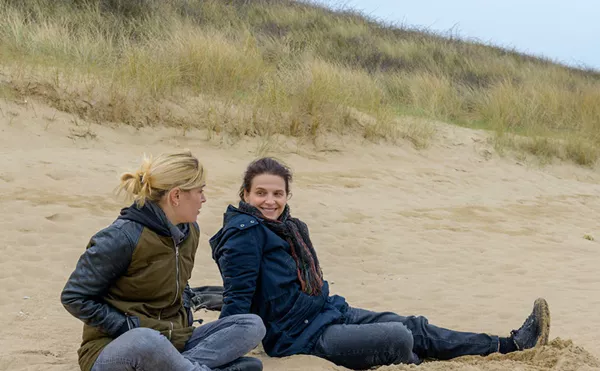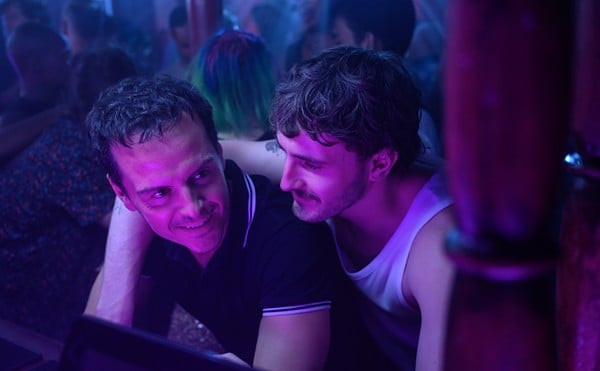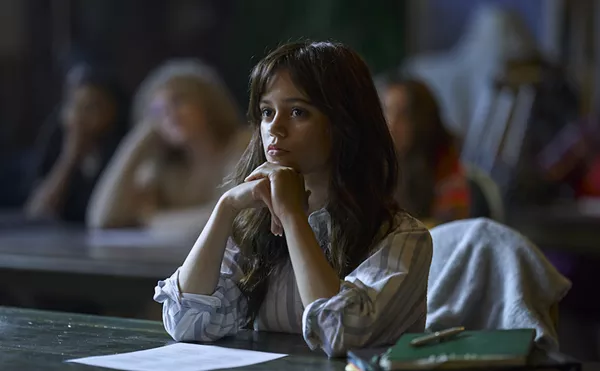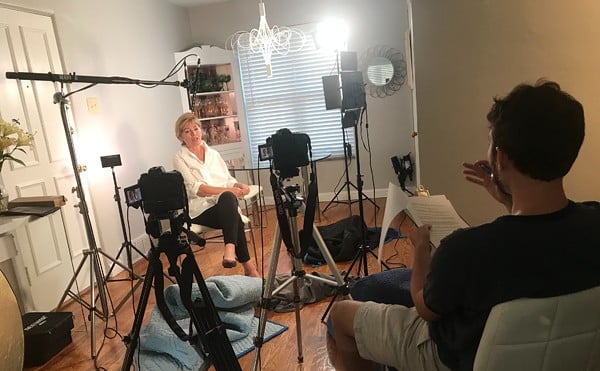Further investigation proves fairly pleasing and surprising. Carefully meandering its way around the cynical cinematic sidewalk most commonly trod through American suburbia, Mendelsohn's script is rife with unbalanced characters subtly exchanging their own power lines, as well as metering one another's abundant verbal gas. Nobody is in their right mind in the little town of Babylon, but then again, nobody is hastening off the deep end, either. No guns, no drugs, no suicides here, just a long day's meditation on incomplete feelings, unfinished thoughts and the tiny details of life in between. As Barbara Barrie puts it to Bob Dishy at one point, "The reality is so real. I don't know any other way to describe it."
Barrie beautifully portrays Sue Berlin, a persnickety grade-school teacher and mother to the movie's eponymous 32-year-old ingenue, Judy (Edie Falco from The Sopranos, sporting "adult braces"). It's the second day of the new school year, during which a phenomenally long eclipse is due to drape the town in darkness, and much emotional re-evaluation is afoot. As Judy prepares to depart for California, to realize her half-baked dreams of acting in "the Biz, or whatever," Sue confronts the effects of her own stern nature, as well as her denied feelings for stoic school principal Arthur Gold (Dishy). Meanwhile, Arthur's wife, Alice (Madeline Kahn), jabbers to herself in wispy near-delirium, obsessed with her own aging and unfulfilled longing. "He was hugging me! Did you see it? I need proof!" she bellows to her housekeeper, Carol (Novella Nelson), hoping to crystallize a moment of sweetness with her baffled husband before he flees to work and the earth falls under the shadow of the moon.
The eclipse (acknowledged as an easy metaphor) temporarily disrupts the bright, cheery order of Babylon, sending the characters wandering into their arcs. Providing the focal point is the Golds' son, David (Aaron Harnick), dejected and pathetic after a failed attempt to succeed as a filmmaker in the faraway jungle of Los Angeles. David's perceptions of his hometown and its inhabitants give form to the fragments that make up Judy Berlin, which is less a drama than a behavioral study. With vulnerability and congeniality at a premium, mild but consistent unpleasantness abounds. Nonetheless, when Judy presses David to voice his dream of directing a documentary about Babylon, he firmly states that he'll do "nothing sarcastic."
That philosophy imbues this inescapably self-reflexive movie with a rare compassion. For instance, when Judy explains that she provoked laughter from a YMCA drama class, David kindly suggests that "maybe they were uncomfortable with the rawness." Yet, as her amusing day job -- re-creating antiquated farm life at History Village -- attests, there's nothing "raw" about Judy at all. Despite her ambition to be like Diane Keaton ("She goes off to Hollywood, does some big studio flick about mixing up twins or some shit like that, gets a shitload of money, comes back here and does whatever she wants!"), Judy is as much a product of the sweet and boring little town as David is. Without their roots in the tiny microcosm, they wouldn't have much to talk about.
There is constant risk, of course, of Mendelsohn's (by way of David) descending into nebbishy navel-gazing. In some scenes, the Woody Allen stammering and precious cuteness do become tiresome. Fortunately, the furtive attempt at romance between David and Judy does not consume the movie; the director has surrounded himself with a top-drawer ensemble. A tremendous amount of attention is paid to the nuances and gestures of the veteran actors, whose non sequiturs come off as crude poetry on Mendelsohn's stark stage. Jeffrey Seckendorf's glowing black-and-white cinematography and Michael Nicholas' music (performed on harpsichord by Elaine Comparone) combine to produce a truly singular effect.
It is especially worthy of note that this is Madeline Kahn's final feature. Those who remember her best from Mel Brooks' comedies may find the voice familiar yet be startled by her frank portrayal of Alice. It's a rare and graceful career coda. As she exclaims to herself, striding beneath the streetlights of the darkened town, "Something like this happens, and I feel like the rest of the world and I are speaking the same language!"
Opens July 7 at the Plaza Frontenac.





